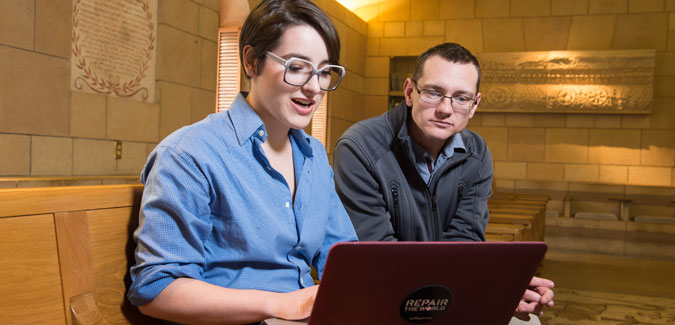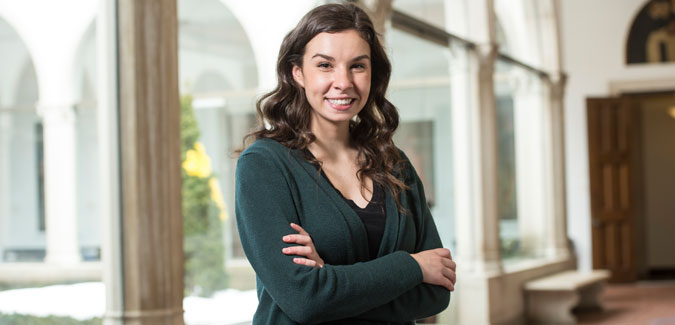Information for Prospective Students
Having a better understanding of people—their brains, cultures, traditions, beliefs, stories—leads to superior communication skills and the ability to understand and appreciate diverse points of view. Cultural competencies are crucial assets for any profession that engages with people of diverse beliefs and points of view, from social work to non-profit management, health care to international diplomacy, and business to law.
The Department of Religious Studies welcomes you to participate in exploring some of the significant issues and questions of our time through the lens of major religious traditions. Whether you're interested in taking one class, or making us your academic home, we want to work with you. Our small size affords us the ability to truly nurture our students and provide them with a personalized advising experience. Every student completes a senior capstone thesis and every student is encouraged to work with a faculty mentor on a research project or internship.
Major Offered
B.A., Religious Studies
Enrichment Opportunities
Research, teaching, and service projects
Careers
Careers in teaching, business, advertising, journalism, museum and archival work, and politics, among others!
Advising
Each incoming student is assigned an academic advisor within the Dietrich School’s Academic Advising Center. Students are required to meet with their advisor at least once per term before they can enroll in classes for the next term. Students are encouraged to schedule additional appointments as necessary. Students will remain with their assigned advisor until they declare a major; once a major is declared, the student will transition to a new advisor within their major department.
Sarah Koros and Brock Bahler

In my first term at Pitt, I sat in that classroom as Brock Bahler, visiting assistant professor in the Department of Religious Studies, assigned our class to write a final research paper... Dr. Bahler returned the essay a few weeks later and recommended that I submit an abstract to present this work at the Eastern International Regional Conference for the American Academy of Religion (EIRAAR), which Pitt was hosting that year. I was grateful for my professor's encouragement and, with other faculty support, I was invited to present at the EIRAAR in the spring. ... What has impacted my research path the most is the dedicated faculty mentors who have helped me find this path. Many faculty members have been so incredibly supportive. The Department of Religious Studies is filled to the brim with fantastic professors who are also wonderful mentors. Pointing me toward goals and opportunities I didn't even know were options, Pitt's faculty offered meindividualized mentorship amongthe massive institutional resources.
–Sarah Koros (Religious Studies and Sociology majors)
Read Sarah Koros' Paths to Research: Faculty Mentoring from Your First Term to Your Final Project »
Our faculty members take full advantage of resources in and beyond Pittsburgh in designing unique field trip experiences for our students. Recent outside of the classroom learning opportunities include excursions to the American Jewish Museum and Holocaust Center of Pittsburgh; the relics collection at Saint Anthony Chapel; the Islamic Center of Pittsburgh; and the Sri Venkateswara Temple. This year students will travel to the Cleveland Museum of Art to learn more about the ancient Mediterranean world, and our Study Abroad program in Israel is scheduled to launch in the Summer of 2019.
Rebecca Clements
Rachel Evans

As my interests expanded and grew, so did my research. I had discovered a passion for religious studies and added it as a second major. For my capstone project in religious studies, I knew that I wanted to focus on the intersection of religion and medicine, but I wasn’t totally sure how. After talking with my capstone advisor and another religious studies professor (who is also a practicing physician), I decided to write about how religion has influenced and continues to influence patient care in two historically faith-based hospitals, UPMC Mercy (founded by Catholic nuns) and UPMC Montefiore (founded by Pittsburgh’s Jewish community).
–Rachel Evans (Neuroscience and Religious Studies)
Read Rachel Evans' Paths to Research: From FE-R to MD »
For more information about our department, or to schedule a visit or tour, please contact the Dietrich School's recruitment team at artsci@pitt.edu.
If you are interested in graduate programs at the Dietrich School, please email asgrad@pitt.edu for more information.